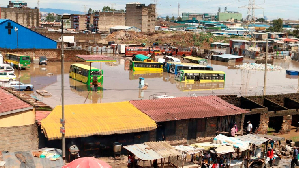Business News of Thursday, 18 November 2010
Source: GNA
Volta Trade, Investment and Cultural Fair is here again
A GNA feature by Sepenyo Dzokoto
Ho, Nov. 18, GNA - The Volta Region would open itself up again for two weeks from November 22 to December 5 for entrepreneurs to take another close look for business opportunities which the 20,570 km square land mass has. It is worth noting that there have been many attempts in the past through small shows, political platform talks and trips abroad to showcase the potentials of the Region.
This version, The Volta Trade and Investment Fair, which made its debut in 2009, is perhaps the most ambitious jingling of the wares of the Region ever.
Fair planners have added a cultural aspect to the 2010 event and christened it Volta Trade and Investment and Cultural Fair. The Fair coordinated by the Netherlands Development Organization (SNV) is under the auspices of the Volta Regional Coordinating Council (VRCC). Collaborating agencies include the Ghana Investment Promotion Council (GIPC), National Board for Small Scale Industries (NBSSI), the Municipal and District Assemblies, Ho Polytechnic, the Volta Regional House of Chiefs and the Volta Foundation, a regional development advocacy group.
Planning Committee Publicity Chief, Richard Ameyedewo, says the cultural aspect is to bring on board something that adds value to the area's tourism potential. So the 2010 event is somewhat unique. The Volta Region by the 2000 population census has 1,635,421 people. It has virtually all the vegetation zones in the country - sandy beaches, grassland, semi-deciduous and deciduous forests, semi and thick forested zones.
It has its fair share of waters. The most prominent is the Volta Lake, whose middle and lower courses wash the region from north to south where there is the Atlantic Ocean.
The region, largely agrarian, is scenic, with many nature sites which are in their crude form waiting to be developed.
In the area of big industries, the Volta Region is a desolate tract. Flagship Juapong Textiles collapsed once, was resurrected and given a new name and owners, but is comatose again. Now there is only one medium level industry in the Region - the Diamond Cement Factory at Aflao. Agriculture, the mainstay of the Region's economy, is at the primary level, producing with hoes and cutlasses. There only a few big farms and a few big time farmers; almost all farmers are smallholder subsistence farmers. Irrigated farms are also negligible, the much touted Afife Irrigation project being perhaps the only one of significance. The Volta Region is in the bottom rungs of a number of economic growth indicators, according to a 2008 survey of the Association of Ghana Industries (AGI) that covered subjects ranging from Technology usage to Enabling Business Climate.
According to Mr Seth Quarshie Yawlui, Adviser to the Netherlands Development Organization (SNV), the institution that is for the second year running facilitating the Volta Fair, the survey indicates that the Volta Region is the least in terms of the "Ease of Doing Business in Ghana." However, the region has a higher potential to support viable business investment if the bottlenecks are tackled. Mr Yawlui is calling for "changes in some of the business trends to improve productivity, employment and the fortunes of the business practitioners".
He notes that the key areas of business in the region are tourism and agriculture, which remain largely untapped. Finding the wherewithal within and without to mine the salt in basins and environs of Keta; grow and process legumes, vegetables and fruits; cultivate sugarcane in the vast soggy lands; grow the grains, roots and tubers across the region from Keta to Kete-Krachi is all that the Fair is seeking to nudge the region to do.
Additionally, the cocoa industry must not die as its potentials and those of the palm and coconut industries could be immeasurable when linked properly with some forms of processing. The Region's other competitive industrial strength is tourism. The investments should be directed at integrating the nature sites into running businesses.
As these areas grow, other service sectors would follow to give business in Volta Region a boom. That region is strategically placed between the bustling markets of Tema-Accra metropolis and the huge Togo, Benin and Nigerian clientele to the east. Colonel Cyril Necku, (rtd) Deputy Volta Regional Minister, two months after the 2009 Fair, told the GNA in Ho that the Region could be at the threshold of a business take-off following the flurry of business enquiries and contacts.
Consequently, he said, the Volta Regional Coordinating Council (VRCC) was configuring new and existing business support bureaucracies to manage the emerging situation. Colonel Necku, who is Chairman of the Fair Planning Committee, said among companies and groups that had made enquiries were the Council of Ewe Associations in North America (CEANA), Bill Gates and Ford Foundations. He also mentioned a huge interest of Chinese concerns in agriculture and they had already come looking round abandoned State Farms for possible reactivation.
Planning Committee Publicity Chief, Richard Ameyedewo, states that that pudding can be tastier after the successful 2009 event, as more companies and groups have expressed interest. The business scenario in the region is not different this year. The seminars behind the scenes would be discussing credit management and business management skills and experts would be on hand to strap-up linkages just as it happened last year. Mr Emmanuel Yao Nyaku, Volta Regional Manager of the National Board for Small-Scale Industries (NBSSI), is concerned that micro businesses were not visible last year and says they must be targeted since that sector "is the pillar of the regional economy". Big businesses wherever must integrate their supply linkages into the local economy, and same must happen in the Volta Region to raise living standards.
Exhibition planners must go beyond the platform speeches and fanfares of the stands to serious business throughout the year by linking the Volta Region to the rest of the world through the information highway, stock up-to-date data on all that is business about the Volta Region at offices across the Region. People must know at the click of a button how much is invested in the region, the sources and areas. Perhaps it is not too much to demand of all officers of the various Assemblies and the VRCC and other stakeholders, especially the front desk officers, to become mental billboards of the bid of the Volta Region to go big time commercial. 18 Nov. 10
Opinions









